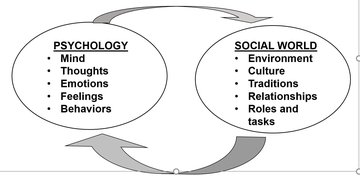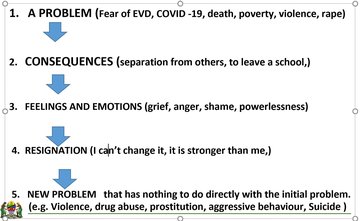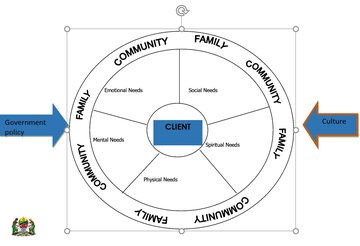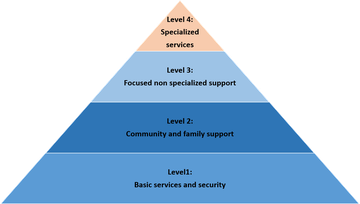What is Psychosocial Support
COVID-19 virus disease outbreak
Questions: - What kinds of reactions may they have? - What can be done to support them?
Role play/work of reflection in groups
Context: A father is suffering from COVID-19 and has been admitted to a treatment center. His wife and four children have been quarantined and they are all in great fear of death.
Complete the survey linked below and then return to this training module by pressing the BACK button in your browser twice.
PSYCHOSOCIAL
- The term Psychosocial underlines the dynamic relationship between the psychological and social effects, each continually influencing and interacting with each other.
- This suggests that each person is influenced by the integration of:
- Psychological or psycho component such as the mind, thinking, emotions, feelings and behaviour. And the social world or context in which we live including for example the environment, culture, traditions interpersonal relationship with family, community and friends and life tasks such as school or work.
Why do we use the term “psychosocial?”
The dynamic relationship between psychological and social effects of experiences each continually influencing the other

PSS Definition
Psychosocial support may be defined as an ongoing process of meeting the physical, emotional, social, spiritual and mental needs of people
It is the intentional act of ensuring that in the process of meeting the physical needs of people, provision of emotional and social needs are included
Psychosocial Support
- A continuum of care and support which influences both individual and social environment in which people leave.
- Care and support offered by caregivers, family members, friends, neighbours, teachers, health workers, and community members in a daily basis.
- Ongoing respectful nurturing relationships that communicates care, support and protection.
What is psychosocial wellbeing?
- Psychosocial Wellbeing has been defined as the ability to make sense and have a degree of control over one’s world with a sense of hope for the future.
- With regard to children, psychosocial wellbeing is the positive age- and stage-appropriate outcome of children’s development.
- Psychosocial wellbeing is seen as an interdependent aspect of several other overlapping aspects of total or holistic wellbeing.
- These aspects have at various times been described as physical, mental, social, emotional and spiritual aspects.
- The focus is not just on the individual, but on larger social units such as families and communities
The psychosocial approach
- PSS approach aims to create an environment that promotes the psychological & social wellbeing of individuals
- PSS approach views individuals to be in a state of constant, dynamic interaction with their social environment.
- PSS approaches is not only on the individual includes larger social units such as households, families and communities.
PSS and the possible stress effects

WHEEL MODEL

GROUP WORK
- What implications does the wheel model have for programs? How would this model shape or influence a client focused program?
- What are the advantages of the wheel model?
- What are the potential challenges of the wheel model.
Strength of Wheel Model
- All focus of the intervention is on the client
- The best interest of the clients are paramount in this model
- All necessary basic needs of client are provided and given due attention
- All sectors are involved in supporting the client
- It is a holistic approach.
Potential challenges for wheel model
- The wheel model focuses intensely on the client. This may result in the neglect of the role of the family
- The family may also need support in order to support the client adequately.
- The child may be overwhelmed by the amount of interventions that the different organisations offer.
- If the client is a child, he/she may be spoiled through handouts
Key learning points
- Being client centered is about ensuring the best interests of the client are upheld all times.
- The cultural context and value system plays an important role in determining how client’s rights can be met or upheld.
- Remaining family and community focused for solutions around the problems and concerns of the client with a gender perspective will ensure long term, sustainable care and support
PYRAMID MODEL

PYRAMID model
Layer 1. - Includes advocacy for basic services, documenting impact of services on PSS wellbeing and/or mental health. Layer 2. - Strengthening family and community care and support; activating social networks (support groups); providing information on constructive coping methods, available resources and community mental health education. Layer 3. - Children, youth, family and group interventions by trained and supervised workers. This includes children and youth who have special coping needs, such as survivors of gender-based violence and those who have experienced complicated forms of grief. Layer 4. - Psychological and psychiatric support for those who experience significant difficulties in basic daily functioning.
Key learning points
- The Intervention Pyramid Model reflects a multi-layered model of support networks. All the layers should be in place at all times and there should be a high degree of referral and coordination between them.
- The different kinds of support and interventions vary in their potential reach.
- Meeting the needs at each level of the pyramid can contribute enormously to psychosocial wellbeing.
- The pyramid tapers towards the top, indicating that relatively few people require specialized services.
- The base is wide since everyone requires the provision of basic services and security.
- Psychosocial wellbeing and feeling of connectedness are important aspect of a client’s life.
- Communities can be integral in introducing different approaches that can be used in meeting the client’s psychosocial needs
- Gender and Cultural issues also affect interventions and strategies
- For children, advocacy on their rights can lead to their increased participation and can be introduced at community level
Conclusion
PSS helps develop social energy or emotional intelligence. If clients are “emotionally healthy” they will be in a better position to develop themselves, their families and communities and ultimately the nation
Click the link below to continue your training module:
Average Rating: ☆ ☆ ☆ ☆ ☆ (0 reviews)


Maoni 19
Tafadhali ingia au fungua akaunti yako
S
S.Rwambo
5 years, 3 months ago
C
cefadmin
5 years, 3 months ago
T
TINDO
5 years, 3 months ago
J
Jonas gaganija
5 years, 3 months ago
M
MLIULA
5 years, 3 months ago
N
NRodrigues
5 years, 3 months ago